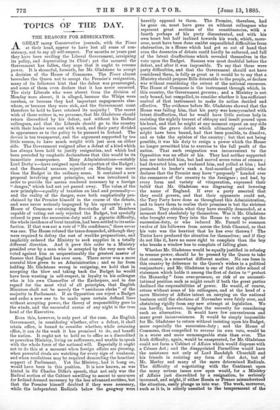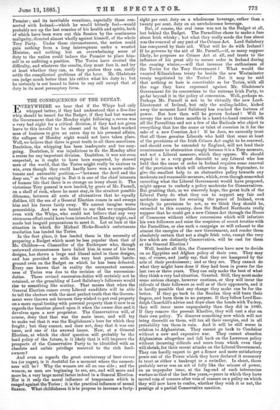TOPICS OF THE DAY.
THE REASONS FOR RESIGNATION.
AGREAT many Conservative journals, with the Times at their head, appear to have lost all sense of consistency, not to say all self-respect. For months or "years past they have been reviling the Liberal Government, arraigning its policy, and depreciating its Chief ; yet the moment the Government has fallen, they urge that it ought to resume power. It is shameful, forsooth, for Mr. Gladstone to accept a decision of the House of Commons. The Times almost beseeches the Queen not to accept the Premier's resignation, many of its followers hint that the defeat was prearranged, and some of them even declare that it has never occurred. The sixty Liberals who were absent from the division of Monday were absent, it is alleged, because the Whips were careless, or because they had important engagements elsewhere, or because they were sick, and the Government must therefore be held to have retained its majority ! The secret wish of these writers is, we presume, that Mr. Gladstone should return discredited by his defeat, and without his Radical colleagues, and that the Liberals should go to the country with their leader worn out with work, and their party divided in appearance as to the policy to be pursued in Ireland. The device is too transparent, and the argument supported by too little reason, to have much weight with just men on either side. The Government resigned after a defeat of a kind which has always been held to justify resignation, and which had been preceded by emphatic declarations that this would be its immediate consequence. Many Administrations—notably Lord Derby's—have resigned upon the rejection of the Budget ; and the financial measure rejected on Monday was more than the Budget in the ordinary sense. It contained a new proposal involving great principles, and was introduced in order to provide the means rendered necessary by a foreign " danger," which had not yet passed away. The value.of the new principle—equality of taxation on land and personalty— and the reality of the danger, were both emphatically proclaimed by the Premier himself in the course of the debate, and were never seriously impugned by his opponents ; yet a House of Commons containing five-sixths of all Members capable of voting not only rejected the Budget, but specially refused to pass the succession duty until a gigantic difficulty, the whole incidence of local taxation, had been settled to its satisfaction. If that was not a vote of "No confidence," there never was one. The House refused the taxes demanded, although they were required to defray the cost of warlike preparations, and implicitly ordered the Ministry to seek supplies in a totally different direction. And it gave this order to a Ministry presided over by a man who is accepted by the very men who voted against him as unquestionably the greatest master of finance that England has ever seen. There never was a more scornful blow given to an Administration ; and so far from holding Mr. Gladstone wrong in resigning, we hold that in accepting the blow and taking back the Budget he would have been wanting in self-respect, in loyalty to his colleague who is his own Chancellor of the Exchequer, and in due regard for the most vital of all principles, that English Ministers shall not be merely the " assiduous clerks " of the majority in Parliament. If an Opposition can reject a Budget and order a new one to be made upon certain defined lines without accepting power, the theory of responsibility goes to the windy, and the successful orator of any night is the true head of the Executive.
Even this, however, is only part of the case. An English Government, in considering whether, after a defeat, it shall retain office, is bound to consider whether, while retaining office, it can do the work it has promised to do, and benefit the nation. It ought not to hold on to office as a discredited or powerless Ministry, living on sufferance, and unable to speak with the whole force of the national will. Especially it ought not to do this at a moment when foreign affairs are pressing, when powerful rivals are watching for every sign of weakness, and when resolutions may be required demanding the heartiest support of Parliament. Yet the Ministry, had it hung on, would have been in this position. It is now known, as was hinted in Sir Charles Dllke's speech, that not only was the Radical section of the Cabinet unwilling to assent to measures for Ireland deemed necessary by the less advanced sectlbns, but that the Premier himself doubted if they were necessary, while the independent Radicals below the gangway were
heartily opposed to them. The Premier, therefore, had he gone on, must have gone on without colleagues who represent great sections of the constituencies, with a fourth perhaps of his party discontented, and with his own heart but half inclined towards his work, which, moreover, must have been done amidst unparalleled difficulties from obstruction, in a House which had got so out of hand that even the decencies of debate could hardly be enforced, and full of the latent disaffections which revealed themselves in the vote upon the Budget. Success was most doubtful before the defeat, and after it was impossible. To say that these were party difficulties, and that the Government should not have considered them, is folly as great as it would be to say that a Ministry should propose Bills detestable to the people, or declare war without considering the extent of the national resources. The House of Commons is the instrument through which, in this country, the Government governs ; and a Ministry is not only bound, but compelled, to consider whether it has sufficient control of that instrument to make its action decided and effective. The evidence before Mr. Gladstone showed that the House was failing him, that his party was honeycombed with latent disaffection, that he would have little serious help in resisting the nightly torrent of obloquy and insult poured upon his head, and that he might at any moment expect on any side question the grave defeat which ultimately arrived. He might have been bound, had that been possible, to dissolve, and so take the opinion of the country ; but that not being possible, it was his duty to resign a power which the House no longer permitted him to exercise to the full profit of the nation. That such resignation was inconvenient to the Opposition was no affair of his. They had neither supported him nor tolerated him, but had moved seven votes of censure ; had thwarted him, and traduced him, and yelled at him ; had promoted to leader's rank a foul-mouthed politician who declares that the Premier may have "purposely" handed over the commerce of the country to the foreigner ; and had, by every form and variety of vituperation, expressed their belief that Mr. Gladstone was disgracing and lowering the name of England. If ever a party asserted that they could govern, and that their opponents could not, the Tory Party have done so throughout this Administration, and to leave them to realise their promises is but the strictest justice. They obtain what they have steadily demanded, at a moment fixed absolutely by themselves. Was it Mr. Gladstone who brought every Tory into the House to vote against the succession-duty, or who induced Mr. Parnell to summon twelve of his followers from across the Irish Channel, so that his vote was the heaviest that he has ever thrown ? The Tories have produced the situation for themselves; and if they do not like it, have no more right to complain than the boy who breaks a window has to complain of falling glass.
Whether Mr. Gladstone would be equally justified in refusing to resume power, should he be pressed by the Queen to take that course, is a somewhat different matter. No one loses in this country by deference to the Queen's wishes in a political conjuncture ; and Mr. Gladstone is one of that older school of statesmen which holds it among the first of duties to " protect the Monarchy" from over-pressure, or risk of an unconstitutional position such as might result if both the great parties declined the responsibilities of power. He would, of course, return without some of his colleagues, and at the head of a mere Ministry of Affairs intent on carrying on the national business until the elections of November were fairly over, and abstaining rigidly from any new attempt at legislation. We can hardly, however, imagine the necessity for considering such an alternative. It would have few conveniences and many great inconveniences. It would be simply impossible for Mr. Gladstone to return without insisting upon his Budget, more especially the succession-duty ; and the House of Commons, thus compelled to reverse its own vote, would be in a worse and more unmanageable state than ever. The Irish difficulty, again, would be exasperated, for Mr. Gladstone could not form a Cabinet of Affairs which would dispense with a Crimes Act ; and the disappointed Parnellites would have the assistance not only of Lord Randolph Churchill and his friends in resisting any form of that Act, but of Mr. Morley and many of the more determined Radicals. The difficulty of negotiating with the Continent upon the many serious issues now open would, for a Ministry of Affairs just discredited by a resignation, be seriously increased, and might, if either Russia or France misunderstood the situation, easily plunge us into war. The work, moreover, such as it is, is utterly unsuited to the temperament of the
Premier ; and its inevitable vexations, especially those connected with Ireland—which he would bitterly feel—would probably use up the last remains of his health and spirits, both of which have been worn out this Session by the continuous malignity, directed almost wholly against himself, of the whole Tory Party. Under these circumstances, the nation could gain nothing from a long interregnum under a wearied Minister, and nothing but an overwhelming sense of duty to the nation could induce the Premier to place himself in so unfitting a position. The Tories have created the difficulty, and whatever the results, they must face it, and try at least whether they can, as they profess they can, easily settle the complicated problems of the hour. Mr. Gladstone can judge much better than his critics what his duty is ; but he certainly is not bound to listen to any call except that of duty in its most peremptory form.



































 Previous page
Previous page